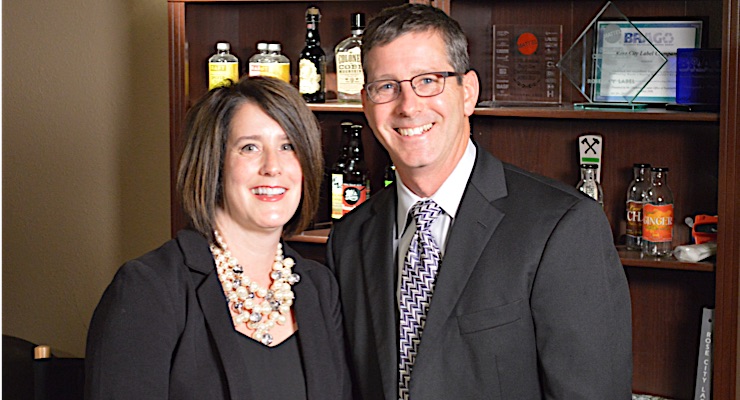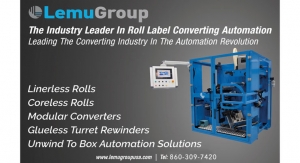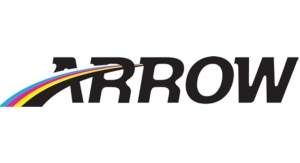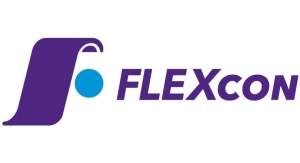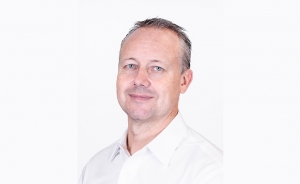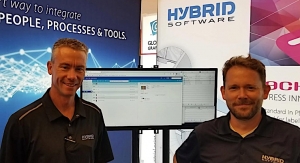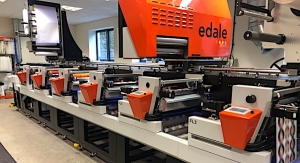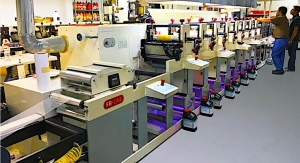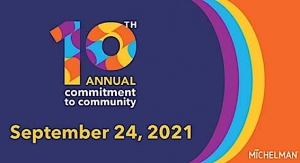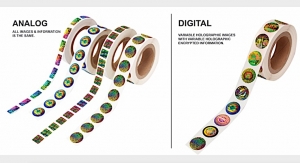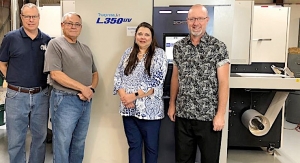L&NW Staff11.30.20
Like many of their peers, Portland, OR-based Rose City Label manufactures labels for a wide range of segments, including gourmet food, cannabis, equipment, variable and static barcodes, lumber, warning labels, and beer and wine. But the company's focus on sustainable products and practices serves as a key differentiator.
Family-run for over 90 years, Rose City was purchased by a second family – the Pillsburys – in 1974. When Mike Pillsbury passed away in 1998, his children, Scott and Whitney, became co-owners. Today, this custom label manufacturer is well-diversified with approximately 700 customers, many of whom are “legacy” and have stayed with the small print shop across the years. Rose City’s singular focus is to help small and midsize Pacific Northwest companies connect to their customers and sell more products.
For an in-depth profile of Rose City Label, click here.
Rose City had always focused on sustainability through some of the usual routes like recycling office paper and using non disposable silverware and cups in the company kitchen. In 2009, their eco-journey kicked off in earnest when the company became a Certified Green Business in Clackamas County.
Scott Pillsbury, president, notes, “We were happy to win this award but there was no corrective action. I really wanted to be held to a higher bar and uncover more paths to improvement. I have kids, live in Oregon and like trees – sustainability has always been a foundational value for my sister and myself. So we began to look for opportunities, like environmentally-friendly water-based inks and wind power, to put these long-held personal beliefs into practice in a business setting each time that we needed to upgrade equipment and processes at Rose City.”
For many years, one of the last remaining solvent chemicals in Rose City's shop was photopolymer platemaking solvents. In 2016, Pillsbury determined that, “We needed a new plate processing solution. Our solvent system was dying, and our solvent recycler was closing. And we wanted faster processing.”
With its focus on eco-friendly solutions, Rose City wanted to use this opportunity to move away from the smell and caustic chemicals used in solvent processing. Pillsbury notes, “Sustainability is part of the conversation in every decision we make. It is baked into our culture at this point. We won’t sacrifice quality, but we will always lean on the most sustainable solution.”
Because of the strong support Rose City had received from All Printing Resources (APR) in the past, Pillsbury turned to his local APR rep, Tessa Libby, to source a high-quality water-wash printing plate system. He says, “We always look to APR first. We would rather buy more from a trusted vendor than waste time shopping.”
With APR’s support, Rose City Label became one of the first shops on the West Coast to install a water-wash printing plate system. This system uses a type of printing plate that can be processed with just soap and water–- no solvent required. With this sustainably-friendly solution, Rose City can now make high quality plates that run well on press but are odor-free to create. And for the past six quarters, none of the products purchased from APR have had VOC emissions.
An additional benefit is a 60% reduction in plate processing times. This means plates are on press faster with less downtime. With no solvent to absorb into the plate, there is no need to wait for evaporation. This becomes especially critical when there’s an emergency and the press is down. For example, if a typo is found and they need to produce a new black plate as quickly as possible. With the new system, they spend far less time on plate drying.
Today, Rose City utilizes Fujifilm’s Flenex plates purchased from APR. In addition to the sustainability benefits, Rose City has saved money as it no longer has to pay for solvent or recycling. The used water is safe enough to put down the drain, and the system uses less than 30 gallons of water a week. Pillsbury says, “Although savings was not a primary driver, it certainly is a happy coincidence.”
Additionally, because APR and Rose City Label are both members of FLAG (Flexo Label Advantage Group), Rose City enjoys quarterly rebates for its plate material purchases.
Pillsbury adds that print quality has been excellent, and Rose City is “printing better CMYK than ever before, partly due to our growing skills and prepress knowledge but also due to the very fine plates.”
Installation took only a half day, and John Stanford, production coordinator and platemaker, comments, “Why didn’t we switch much sooner? We’re making plates so much quicker – I love this product.”
With this clear commitment to sustainability, Rose City has garnered two additional awards. The first was the TLMI Environmental Leadership Award in 2018 and the second was the 2019 SGP (Sustainable Green Partnership) National Eco Certification. Community is important to Pillsbury, and just as he was mentored by TLMI members in the process of gaining certification, he now speaks routinely with other converters interested in environmental stewardship. He comments, “It’s just part of our giveback. There’s a lot of simple things you can do to get started.”
Pillsbury acknowledges that winning these two awards has been very beneficial to his business. “Although I can’t draw a specific line from water-wash plates to any one new customer, all your customer touch points matter. And, increasing sustainability gets call backs. People care that we care.
“We get excellent print quality, fast processing time and a great partner with APR – and we save the earth," he concludes. "What’s not to like?”
Family-run for over 90 years, Rose City was purchased by a second family – the Pillsburys – in 1974. When Mike Pillsbury passed away in 1998, his children, Scott and Whitney, became co-owners. Today, this custom label manufacturer is well-diversified with approximately 700 customers, many of whom are “legacy” and have stayed with the small print shop across the years. Rose City’s singular focus is to help small and midsize Pacific Northwest companies connect to their customers and sell more products.
For an in-depth profile of Rose City Label, click here.
Rose City had always focused on sustainability through some of the usual routes like recycling office paper and using non disposable silverware and cups in the company kitchen. In 2009, their eco-journey kicked off in earnest when the company became a Certified Green Business in Clackamas County.
Scott Pillsbury, president, notes, “We were happy to win this award but there was no corrective action. I really wanted to be held to a higher bar and uncover more paths to improvement. I have kids, live in Oregon and like trees – sustainability has always been a foundational value for my sister and myself. So we began to look for opportunities, like environmentally-friendly water-based inks and wind power, to put these long-held personal beliefs into practice in a business setting each time that we needed to upgrade equipment and processes at Rose City.”
For many years, one of the last remaining solvent chemicals in Rose City's shop was photopolymer platemaking solvents. In 2016, Pillsbury determined that, “We needed a new plate processing solution. Our solvent system was dying, and our solvent recycler was closing. And we wanted faster processing.”
With its focus on eco-friendly solutions, Rose City wanted to use this opportunity to move away from the smell and caustic chemicals used in solvent processing. Pillsbury notes, “Sustainability is part of the conversation in every decision we make. It is baked into our culture at this point. We won’t sacrifice quality, but we will always lean on the most sustainable solution.”
Because of the strong support Rose City had received from All Printing Resources (APR) in the past, Pillsbury turned to his local APR rep, Tessa Libby, to source a high-quality water-wash printing plate system. He says, “We always look to APR first. We would rather buy more from a trusted vendor than waste time shopping.”
With APR’s support, Rose City Label became one of the first shops on the West Coast to install a water-wash printing plate system. This system uses a type of printing plate that can be processed with just soap and water–- no solvent required. With this sustainably-friendly solution, Rose City can now make high quality plates that run well on press but are odor-free to create. And for the past six quarters, none of the products purchased from APR have had VOC emissions.
An additional benefit is a 60% reduction in plate processing times. This means plates are on press faster with less downtime. With no solvent to absorb into the plate, there is no need to wait for evaporation. This becomes especially critical when there’s an emergency and the press is down. For example, if a typo is found and they need to produce a new black plate as quickly as possible. With the new system, they spend far less time on plate drying.
Today, Rose City utilizes Fujifilm’s Flenex plates purchased from APR. In addition to the sustainability benefits, Rose City has saved money as it no longer has to pay for solvent or recycling. The used water is safe enough to put down the drain, and the system uses less than 30 gallons of water a week. Pillsbury says, “Although savings was not a primary driver, it certainly is a happy coincidence.”
Additionally, because APR and Rose City Label are both members of FLAG (Flexo Label Advantage Group), Rose City enjoys quarterly rebates for its plate material purchases.
Pillsbury adds that print quality has been excellent, and Rose City is “printing better CMYK than ever before, partly due to our growing skills and prepress knowledge but also due to the very fine plates.”
Installation took only a half day, and John Stanford, production coordinator and platemaker, comments, “Why didn’t we switch much sooner? We’re making plates so much quicker – I love this product.”
With this clear commitment to sustainability, Rose City has garnered two additional awards. The first was the TLMI Environmental Leadership Award in 2018 and the second was the 2019 SGP (Sustainable Green Partnership) National Eco Certification. Community is important to Pillsbury, and just as he was mentored by TLMI members in the process of gaining certification, he now speaks routinely with other converters interested in environmental stewardship. He comments, “It’s just part of our giveback. There’s a lot of simple things you can do to get started.”
Pillsbury acknowledges that winning these two awards has been very beneficial to his business. “Although I can’t draw a specific line from water-wash plates to any one new customer, all your customer touch points matter. And, increasing sustainability gets call backs. People care that we care.
“We get excellent print quality, fast processing time and a great partner with APR – and we save the earth," he concludes. "What’s not to like?”

